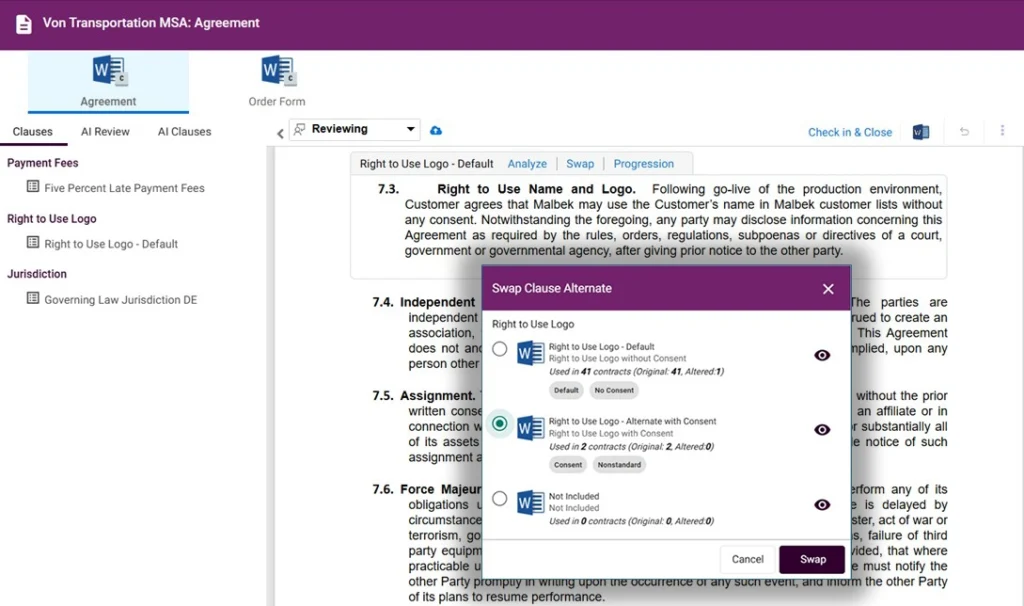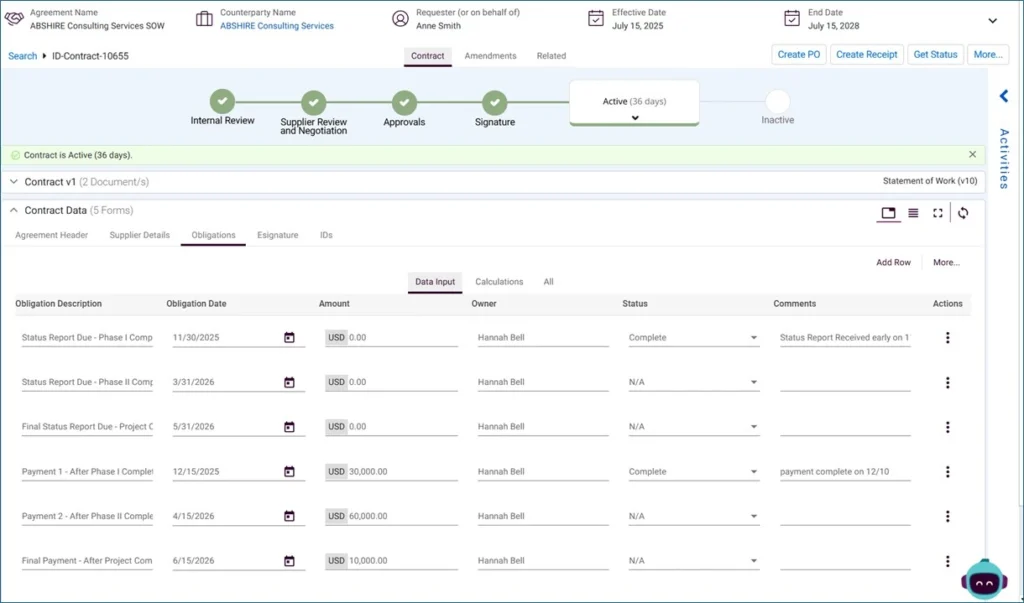Understanding Pre- and Post-Award Contract Management
Like any complicated project, you can make contract management easier if you break it down into simpler steps.
There are two distinct steps in contract management: post-award and pre-award. It might seem like the post-award phase is the most important since it determines how well you carry out the contract. But without the pre-award phase, it’s difficult to find lucrative contracts in the first place, let alone carry them out.
Pre-Award Phase in Contract Management
The pre-award phase of the contract management process is everything you put into a contract before it’s signed and sealed. To write a solid contract, both you and the other party need to understand what you both want, can provide, and expect to get out of the contract and one another. The pre-award phase involves:
Developing Expectations
Since contracts are legally binding documents, both sides need to know what they and their partner(s) bring to the table. Clear and open communication between both parties prevents miscommunications and delivers a clear understanding of the job ahead of time.
From duration to participation to compensation to risk, clear expectations from the very start guide the drafting process and reveal any deal breakers early in the process to save both parties valuable time.
In this stage, both parties can review worst-case scenarios like bankruptcy and put plans in place to provide a clear strategy if such upsets come to pass.
Drafting
With the expectations as a guide and the help of in-house or third-party attorneys, both parties work to write the contract in the drafting phase. The specific wording is critical and regular communication is vital at this stage, no matter how close or far away the two signers might be.

Negotiation
No matter how much care you put in, no legal team can draft a perfect contract on the first try. Honesty and transparency create an open dialogue and start your business relationship off on the right foot, which opens the way to future dialogue and prevents restrictive resentment.
How Contract Lifecycle Management (CLM) Can Aid in These Tasks
A combined platform provides a neutral ground for both parties to review and contribute to the project while avoiding miscommunication. While communication takes priority throughout the negotiation, it also takes time. Modern tools leverage AI capabilities to cut review cycle times in half.
While AI can’t write an entire contract from scratch (yet), it can scan a full stack of contract documents faster than any human being and identify non-standard terminology, as well as perform automatic clause location and identification.
Powerful modern AI tools come pre-equipped to understand the contract positions you prefer and identify the areas where the contract misses the mark. This automated scan lets you shift focus from risk identification to risk resolution and spend more brain power on what matters most.
Post-Award Phase of Contract Management
What is post-award contract management? It’s the second phase of a contract. After the signing, it’s time to roll up your sleeves and deliver on your promise by employing post-award contract management best practices. These practices include:
Managing Contract Compliance
A breach of contract does more than ruin the good faith between partners and the chances of future cooperation. It can also incur monetary or even regulatory penalties. Since contracts are legally binding documents, ensuring both parties follow them to the letter is one of the most important post-award contract management best practices.
Tracking Amendments
At the same time, contracts are living documents. Needs change over time, and contracts must change with them. Both parties require access to any adjustments to the contract that accompany these changes so that they can operate on the same page at all times.
Obligation Tracking
As the contract changes, signers’ obligations change with it. As your half of the deal changes, you need the agility to pivot with it and keep on schedule.

How CLM Can Aid in These Tasks
A CLM program provides clear analytics and metrics that update as the contract does to ensure your entire team understands their responsibilities and maintains contract management post-award best practices at all times.
Instead of a paper trail buried deep in a file cabinet, a digital copy system stores every contract before and after revision to make it easy for both parties to track changes.
The dashboard also tracks both parties’ obligations, KPIs, and time left for renewal to ensure every promise arrives on time, every time. With updates in real-time, partners can keep up with the breakneck pace of modern data-driven business and share updates at an unprecedented speed.
Malbek CLM AI: The Future of CLM
Thanks to the power of modern machine learning, Malbek can offer our clients a premier AI-powered CLM to encourage both pre- and post-award management best practices.
A companion for every team at every stage, Malbek CLM is proud to do it all and make your contract management a simple, seamless, and ultimately enjoyable experience. If you need a CLM package that does it all with a single interface, request a demo to see just how much Malbek can improve your contract management.
FAQ – Pre- and Post-Award Contract Management
What is post-award contract management?
Post-award contract management refers to the set of processes and practices executed after a contract is signed. It ensures that all parties meet their obligations and that the contract delivers the intended business value.
Key elements include:
- Monitoring compliance with contractual obligations,
- Managing amendments, renewals, and terminations,
- Tracking performance against agreed metrics,
- Handling disputes and change requests,
- Documenting ongoing contractual communications.
What distinguishes pre-award from post-award contract phases?
The pre-award phase concentrates on planning, drafting, negotiation, and risk assessment, ensuring contracts are strategically aligned with organizational goals. It requires deep collaboration across internal departments to define obligations, negotiate terms, and formalize legal protections.
In contrast, the post-award phase shifts focus from strategy to execution—ensuring that negotiated terms are upheld, obligations are met, and risks are actively monitored. This phase includes activities such as compliance audits, performance monitoring, renewal tracking, and dispute resolution
What are best practices in post-award contract management?
Best practices include:
- Centralized contract repository for access and control,
- Defined KPIs and performance tracking,
- Automated renewal and obligation alerts,
- Clear governance structures and ownership,
- Periodic compliance and performance audits.
Why is post-contract management critical in modern procurement?
Effective post-contract management mitigates operational and financial risk by ensuring that contractual commitments are upheld, obligations are fulfilled, and compliance is maintained across stakeholders. It enables organizations to extract measurable value from negotiated agreements.
How does post-award management affect contract compliance?
Post-award processes support compliance by:
- Tracking key deliverables and deadlines,
- Managing amendments and scope changes,
- Documenting performance metrics,
- Auditing contract-related activities.
How does post-award management differ in regulated industries (e.g. pharma, biotech, healthcare)?
In heavily regulated industries, post-award management must adhere to stringent compliance protocols, ensuring transparency, traceability, and accountability. Sector-specific requirements significantly shape contract execution.
With Malbek’s experience in all of these industries, you will find sector-specific solutions as an HLS company.
What are common challenges in post-award contract administration?
Despite its strategic importance, post-award contract management is often fraught with operational inefficiencies and systemic challenges:
- Data fragmentation: Contracts are often stored across multiple systems, leading to version control issues and a lack of centralized visibility.
- Manual processes: Reliance on spreadsheets or email for milestone tracking introduces the risk of human error and oversight.
- Compliance failures: Missed deadlines, untracked obligations, and unapproved amendments increase legal and financial exposure.
- Limited stakeholder accountability: Ambiguity over ownership of post-award responsibilities can result in unfulfilled obligations.
- Siloed workflows: Lack of integration between legal, procurement, and operations hinders real-time information sharing and decision-making.
How does Malbek support post-award contract management?
Malbek’s AI-powered CLM platform offers a comprehensive suite of capabilities designed to optimize and simplify the post-award contract lifecycle:
- AI-driven insights: Identify obligation trends, performance gaps, and risk patterns using intelligent data extraction and natural language processing.
- Automated tracking: Monitor deadlines, renewals, and deliverables through configurable workflows and smart notifications.
- Version and amendment control: Manage contract changes with detailed audit trails, ensuring transparency and traceability.
- Configurable dashboards: Visualize KPIs, metrics, contract statuses, and risk indicators through customizable reporting tools.
- Seamless integrations: Connect with Salesforce, NetSuite, Workday, and other enterprise tools for synchronized, end-to-end contract oversight.






